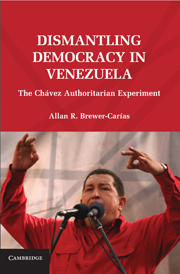Book contents
- Frontmatter
- Contents
- AUTHOR'S NOTE
- INTRODUCTION DEFRAUDING DEMOCRACY THROUGH NONCONSENSUAL CONSTITUENT ASSEMBLIES
- PART ONE THE POLITICAL ASSAULT ON STATE POWERS AND THE FRAMEWORK FOR AUTHORITARIANISM
- Chapter 1 THE 1999 EXCLUSIONIST CONSTITUTION-MAKING PROCESS
- Chapter 2 THE ENDLESS AND ILLEGITIMATE TRANSITORY CONSTITUTIONAL REGIME
- Chapter 3 THE 1999 POLITICAL CONSTITUTION AND THE REINFORCEMENT OF CENTRALIZATION
- Chapter 4 THE 1999 SOCIAL AND ECONOMIC CONSTITUTION AND ITS PROBLEMS
- PART TWO INSTITUTIONAL DEVELOPMENT TOWARD CONSOLIDATING AUTHORITARIANISM
- PART THREE CONSTITUTIONAL REFORMS DESIGNED TO CONSOLIDATE AUTHORITARIANISM
- INDEX
Chapter 4 - THE 1999 SOCIAL AND ECONOMIC CONSTITUTION AND ITS PROBLEMS
Published online by Cambridge University Press: 05 June 2012
- Frontmatter
- Contents
- AUTHOR'S NOTE
- INTRODUCTION DEFRAUDING DEMOCRACY THROUGH NONCONSENSUAL CONSTITUENT ASSEMBLIES
- PART ONE THE POLITICAL ASSAULT ON STATE POWERS AND THE FRAMEWORK FOR AUTHORITARIANISM
- Chapter 1 THE 1999 EXCLUSIONIST CONSTITUTION-MAKING PROCESS
- Chapter 2 THE ENDLESS AND ILLEGITIMATE TRANSITORY CONSTITUTIONAL REGIME
- Chapter 3 THE 1999 POLITICAL CONSTITUTION AND THE REINFORCEMENT OF CENTRALIZATION
- Chapter 4 THE 1999 SOCIAL AND ECONOMIC CONSTITUTION AND ITS PROBLEMS
- PART TWO INSTITUTIONAL DEVELOPMENT TOWARD CONSOLIDATING AUTHORITARIANISM
- PART THREE CONSTITUTIONAL REFORMS DESIGNED TO CONSOLIDATE AUTHORITARIANISM
- INDEX
Summary
The second part of every constitution in modern constitutionalism, as supreme law, is composed by the regulations referred to as constitutional rights and guarantees, including social rights, and to regulate from the economic and social point of view the relation between state and society.
The 1999 Constitution had signs of advances not only in the extensive enumeration of individual, social, economic, cultural, and environmental rights but also in the incorporation of international treaties on human rights, with preferential application when providing for a more favorable regime regarding internal law (Article 23). On economic matters, the Constitution has established a general framework for the development of a system of mixed economy, allowing important participation of the state, which has been used during the past decade in order to construct a capitalism of state system, through confiscation and expropriation of public property and enterprises. I refer in this chapter to this socioeconomic framework of the 1999 Constitution, as well as to the general values and principles on the matter declared in its text.
CONSTITUTIONAL VALUES AND DECLARATIVE PRINCIPLES
The 1999 Constitution formally establishes the general trends of a democratic regime and the rule of law, defining the country as a social democratic state of law and justice (estado democrático y social de derecho y de justicia) (Article 2) and declaring that the rule of law (estado de derecho) is the state submitted to the “empire of the Law.”
- Type
- Chapter
- Information
- Dismantling Democracy in VenezuelaThe Chávez Authoritarian Experiment, pp. 134 - 164Publisher: Cambridge University PressPrint publication year: 2010



